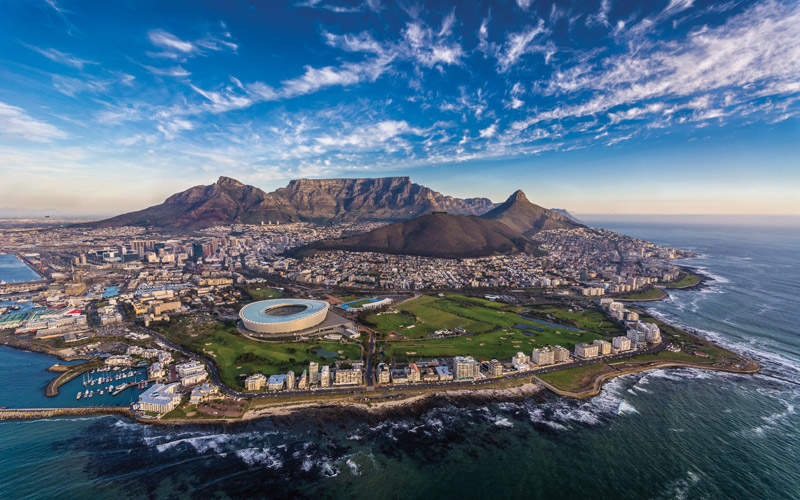One night free at this this fully-catered retreat in Winelands
On the bench
Rock Girl benches are taking our spaces back
When a group of grade seven girls from a school in Manenberg confided in India Baird, a human rights lawyer and the head of the pro-women’s grassroots initiative Rock Girl, that they didn’t feel safe at school, she decided to create a safe space for them by installing a bench next to the tuck shop. The simple act soon steamrolled into a campaign: the Safe Spaces Initiative, a grassroots public art and education drive to raise awareness about the need to create safe places for girls and women in schools, at work and in communities. The idea of “eyes on the street”, in the form of benches in prominent places, aims to make cases of assault more visible in communities.
“Each bench is linked to a toll free number, which connects women to opportunities, resources and support, as well as inspiring stories of 75 successful South African women, from Life and Soul: Portraits of Women Who Move South Africa, compiled by Karina Turok and Margie Orford,” says India.
The first bench, designed by Tim Lewis, with mosaic by Lovell Friedman, was showcased to great acclaim, at Cape Town’s Design Indaba, in February 2011. And since the inaugural safe space, the initiative has proved so successful (there are now over 30 benches) that on Women’s Day 2012 (August 9 2012), Cape Town Mayor Patricia de Lille unveil three more benches on St Georges Mall, as well as renamed a section of the pedestrian way in honour of the unsung heroine, Krotoa, who negotiated for peace and safety in the Cape Colony time (when speaking out was dangerous).
“We want to install benches in urban areas where there is heavier traffic including the CBD, Fan Walk and St George’s Mall, as well as at Cape Town train station, where women from a wide range of backgrounds catch the train. Sister benches, designed by women from disadvantaged communities, will be installed in communities, such as Khayelitsha.”
“Women don’t feel safe”
“Violence against women in the Cape Flats occurs at home, in communities, and even in the toilets outside of their homes,” India explains, “With the threat of violence in close proximity to where they live and work, women don’t feel safe walking home from school or work.”
Abuse in South Africa is exacerbated by widespread poverty, migration, and social and economic insecurity. In some communities, it's a cultural norm for husbands to discipline their wives - a prerogative earned through marriage (Hargreaves et al, 2006). A study conducted in 2004, by Mathews, Abrahams, Martin, Vetten, Van der Merwe and Jewkes, found that four women every day are killed by an intimate partner in South Africa.
“One of the biggest challenges is getting women to report cases. They feel afraid and threatened, or don’t know where to go. Often, women are dependent on the perpetrator,” says India.
In what UNICEF calls the conspiracy of silence, South African women are discouraged by everyone around them (including other women) from reporting violence. Those who do report get a cold response from the criminal justice system; police tell women it’s a private matter, cases are poorly investigated and files are lost. Of all rape cases reported to the South African Police Service (SAPS), between 2001 and 2007, only 7.7% resulted in a successful prosecution.
This has to stop
“At no time in my lifetime have we seen such brutality against women. It is a national crisis,” says co-founder, Karina Turock.
The last ten years has seen much progress for infrastructure in our courts, police, social services and local care centres, trained in how to deal with rape, include Thuthuleza (Xhosa for ‘comfort’) and Saartjie Baartmen Centre for Women and Children (SBCWC).
“Rock Girl networks over 300 organisations for violence against women, local schools and rotary clubs,” explains India, “We hope to bolster the great efforts by NGOs and the government, but also welcome volunteers from all backgrounds.”
Cape Town Partnership, Waterfront Foundation and the Granddaddy Hotel, are among the organisations involved. Rock Girl is currently seeking more sponsors. For more information, contact India Baird +27 (0)82 734 4569, or Karina Turok +27 (0)82 335 4088.
By Lisa Nevitt
Cape Town Partnership have included Rock Girl in their World Design Capital 2014 bid.
Subscribe to our newsletter, follow us on Facebook and follow us on Twitter.








